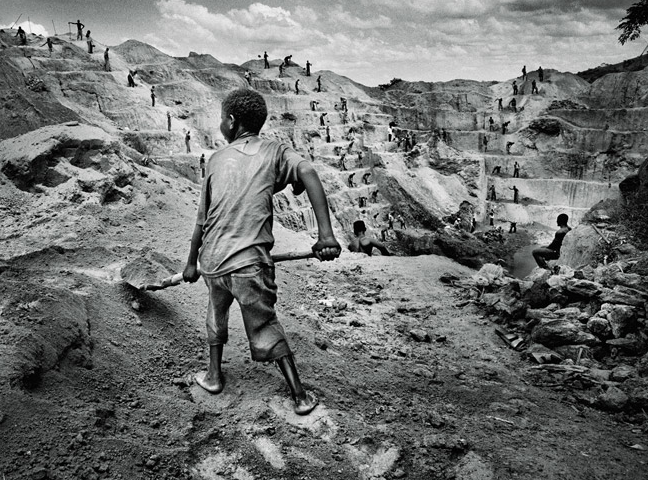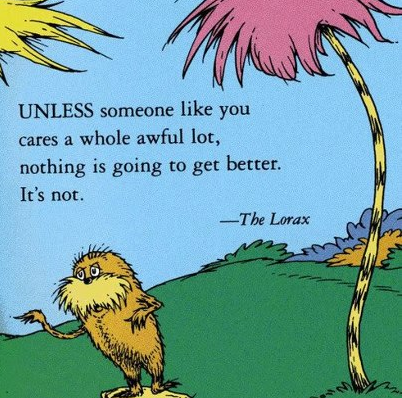When The Hunger Games: Catching Fire alights on movie screens this weekend, I’ll be lining up with my sons to see it. Rather than worry that it is too violent, I’ll use it to talk about the real life violence it symbolizes off-screen – in the Congo, in China, and in America. I will confess with not a little shame, “Guys, we are The Capitol.”
In the world of The Hunger Games, the privileged few reside in “The Capitol,” an oasis of affluence in a dismal post-apocalyptic society. They divert themselves with an annual national competition in which teens hunt and kill each other until one Victor remains. Okay, maybe we don’t force kids to engage in blood sport for our amusement (Mike Tyson might beg to differ), but we do live large off the blood and toil of poor children and adults in third world countries, and our own.
Think I’m going too far? We only need to talk about the Congo, where minerals that helped build my laptop and the screen you may be reading this on are mined by children living a terrified and tortured existence (see, e.g., Oct. 2013 National Geographic, “The Price of Precious”).

Meanwhile “Capitol parents” like me wring our hands over whether “twelve is too young for an iPhone” and debating the appropriate minutes of “screen time” each day. I’m guilty of wearing those blinders.
Or let’s talk about China, where millions of people can’t breathe because their manufacturing standards enable us – here in The Capitol – to buy cheap products. I once challenged my sons to find anything on the shelf at CVS that wasn’t made in China, and I’d buy it. We walked out empty handed. The air quality in parts of China is so bad that a friend who just returned had to seek medical care when he came home to Los Angeles, because his lungs had been so compromised. “I felt like the Lorax,” he admitted, “because I was able to lift myself up and out of that mess.”
Some may say that developing nations like these need time and room to become first world, and that this is the price we all pay until they do. But the situation of despair and inequality is not limited to other countries.
In cities across America, we close our eyes to wage exploitation of service workers. It has been reported that in billion-dollar companies like Walmart and McDonalds, wages are so low that workers need food stamps to feed their families. All this so profits can soar and we can fill up on gadgets we want but may not need.
Facing these realities can be depressing and frustrating. But they can also be motivating. Because our job as parents is to raise kids who can appreciate the abundance in their lives, and to inspire them to change the world. It’s imperative that we tell them that the amenities we enjoy – electricity and electronics, for starters – are often at the expense of others. And it is also imperative that we empower them to do something about it.
And they can. We may not rule the world, but there is power is in our purse strings. We can demand that companies use products made with conflict-free minerals. If none exist yet, then they’d better exercise their influence to change that. We can exercise consumer choice, shopping at small stores where our dollars don’t support unfair labor practices. We can buy items made with sustainable, non-toxic materials. Investors can choose Socially Conscious Investments, which encourage CEOs to do the right thing even if it’s for the wrong reason. We can support efforts of vulnerable workers to unionize, as car wash workers in Santa Monica did last year, and we can patronize businesses that pay workers fair wages. We can raise our voices in favor of paying living wages, recognizing the dignity of all people as we enter a reflective, sacred time of year.
Most importantly, we can strive not to shield our kids from the truth. To be honest, in an age-appropriate way. We owe it to our kids to do the right thing, not to bury our heads like The Capitol-dwellers in order to make our privileged existence palatable. We owe it to Katniss.




Greetings, Laura. This is a well written post and I appreciate the perspective tremendously. I’m reminded of how important it is to not only talk to our children about issues like this, but as parents to walk the walk of humility and conservation and ultimately of gratefulness. Life is overwhelming and its easy to hunker down and pull the covers over our eyes, it takes effort to engage. We may often fail, but the times we succeed are noted by our children more often than not because it feels good to give back– it’s purposeful. The issue of violence in Hunger Games is a whole other thing and perhaps better left for another discussion. Happy Thanksgiving…
Thank you for the comment, Gerard. Nataly also raised the issue of violence, which I had glossed over like it was nothing, when that doesn’t accurately represent my feelings. As I said to her, I was a vehement anti-Hunger Games parent the first time around, at least for our younger son. Our older son had read the book (before I had an inkling what it was about), and as a book-lover I felt that gave him some cred to see the movie. It was disturbing, yes, but we both came out okay.
As I said to Nataly, I may only be able to hold one big concern foremost in my mind at a time, and right now the state of world affairs has trumped the violence card. But both of you have brought me some reason to pause. The book has done what it needs to do — create a world of The Capitol and The Districts that is palpable and that our kids (and we) can understand as reference points to the real world.
Thank you for your comment.
Beautifully put!
Dear Laura-beautifully done and I’ve “shared” with my “tribe.” I agree with you and yet, I, too, struggle with how I’m adding to the madness in “The Capitol.” It’s easy for me to sit here on my ipad in my lovely home and rant. Although I feel that my work is of service and support to women, it’s not creating the deeper change and transformation. Thank you for the reminder. It’s a good way to start the day 😉
I agree, Joy, it’s far too easy to rant. What have I done today to change the way things are? Nothing.
So what say we pick one thing a day. A call to Congress to check on the effectiveness of the Conflict-Free Minerals Law? A donation to a group like Jewish World Watch, that helps fight genocide around the world? A sit-in on Black Friday at Walmart, in support of workers?
One thing a day, a week? If we added our voices to the ones who are already in frong on these issues, would the world change faster?
Laura this is such an important issue and your essay is great!
Great post, Laura, I agree as well about the importance of introducing the kids to some knowledge about the world and it`s problems. Sadly, too many. But I do agree with Gerard that Hunger Games is a whole different thing. I didm`t let Akiva see the first one, nor I will allow the second movie as well. Have a great Holiday week!!
Nataly, thank you for your comments. If you had asked me two years ago, when the first movie came out, I was squarely in the “it’s way too violent camp” for my younger son. I held firm in the face of incessant pleading. (Unfortunately, I went away for one night, and my husband didn’t “get the memo,” and took our little boy to see it. Ugh.) At that time, my older son had read the books, and although I didn’t relish him seeing the images, I agreed to let him see it because he he had processed the story. (I confess, if I’d known what the book was about before he read it, I wouldn’t have wanted him to read it. But I was too late on that front.)
Now I still agree with you, it’s too violent. And yet. I must be at a place in my development where I think it matters less. Maybe it’s because my kids saw the first one and the sky didn’t fall. Or maybe it’s because I can only hold one issue in my mind at a time — I have to forsake the question of violence for the question of what is it going to take for us to get angry enough with the state of horrors in the world to do something? Or, heck, maybe I am just caught up in pop culture frenzy and want to see the movie, so I justify it. (I can be pretty shallow at times.)
In any event, your comment about the violence, and Gerard’s, gave me pause. Thanks.
Sorry folks, I cannot begin to imagine how a film about children killing one another has much to contribute to the good of the world. I have not seen either film, read the books, or plan to do either. I remain shocked about the franchise and its success.
Marcia, I understand completely how you feel. Imagine my shock when I discovered the subject matter of the hottest book in my son’s 4th grade classroom. (From the title, I swear I thought The Hunger Games was about anorexic teens!) But he was reading voraciously, a la Harry Potter, and that counted for a lot. So we continued to read it together and process it together. The violent competition the characters were compelled to participate in was awful. Of course, there was more to the story than that. The power of resistance, for example. Compassion. Loyalty.
I’m not trying to extol the books or movies. My point is the power of story: Suzanne Collins created a science-fiction world so close to our own that we can recognize ourselves, and thereby better understand our own complicated world and our place in it.
Without a familiarity with Katniss, I do not believe my son would have arrived at his “Aha moment” this morning, that the child miners of the Congo struggle and die so that his parents can text and he can play games on a phone — and that that’s wrong. For adults, too, by exaggerating reality, it allows us to see ourselves more clearly. (Kind of like an Aimee Bender story.)
Some folks don’t need this reminder, of course, and I support their choice to keep these images away. But as long as the story is a pop phenomenon, I’m willing to harness it to show my kids that our world is not so different than “Panem,” and that we have free will. We can choose to do something about it, or to ignore it.
Thank you so much for your comment! And for your life of “doing something about it.”